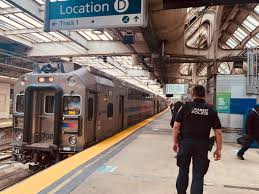New Jersey Transit is currently facing potential disruption as the clock ticks down to a looming strike by its engineers. The CEO of the transit agency, Kris Kolluri, stood firm in his position at Newark Penn Station, presenting the latest offer from the Brotherhood of Locomotive Engineers and Trainmen. This offer, according to Kolluri, would see the average engineer's salary jump by $90,000 to reach $225,000. However, the union responded by emphasizing that their proposal only deviates from NJ Transit's demands by a mere 2%, dismissing Kolluri's critique as baseless.
The contentious negotiations have been ongoing since 2020, with the union advocating for substantial salary increases to retain engineers who might be lured away by higher-paying opportunities in New York-based railroads. Kolluri disclosed that the average pay for an NJ Transit engineer currently stands at $135,000 annually. Despite a prior tentative agreement that aimed to raise this figure to $172,000, it was overwhelmingly rejected by union members. An escalated offer from the union to push salaries to $225,000 followed this rejection, after previously suggesting a raise to $190,000.
The situation reached a critical juncture as both sides seem entrenched in their positions. Kolluri expressed his skepticism about a timely resolution, accusing the union of signaling an intention to strike rather than engage in constructive dialogue. Likewise, Tom Haas, the union's general chairman, forewarned of an imminent work stoppage, attributing potential disruptions to NJ Transit's dismissal of the union's latest proposal.
Given the potential impact on the daily routines of nearly 200,000 commuters reliant on NJ Transit services, the agency has prepared a contingency plan to tackle the potential strike. Emphasizing the need for caution, transit officials have encouraged individuals to consider remote work arrangements if the strike unfolds.
In parallel negotiations, New Jersey Transit and the Amalgamated Transit Union cATUc recently announced a tentative agreement described as "fair and fiscally responsible." The railway service, covering a vast geographic area and providing numerous daily trips across various lines, underscored the importance of this agreement in ensuring operational stability and financial sustainability.
As the labor negotiations continue to unfold, the stakes are high for both NJ Transit and its employees. The intricate dynamics of these discussions underscore the complex interplay between labor demands, operational efficiency, and commuter welfare. The outcome will not only shape the immediate future of transit services but also play a significant role in the broader economic landscape of the region.

